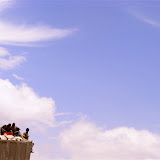
My journey began on a cool, crisp night in the loftiest capital city of a vast continent,
Addis Ababa, or "New Flower," in Amharic, one of the main local dialects. A city so full of contrast that the excesses begin to cancel each other out, create barricades and blinders that are internalized and vanish into reality. The capital city of an ancient nation with a tortured modern history: war, brutality,
ideological persecution, famine, nepotism, cronyism; the good, and all the bad, that can be imagined. A struggle of extremes, a struggle born by the smallest factor in the equation of state, the people, the citizenry.
The driver sped down the darkened road; billboards, some half-lit, seemed like alien apparitions, displaying their alien wares. My window cracked, absorbing the freedom of the unknown, stretching my lungs after 24 hours of recycled air at 34,000ft. The first hints arrived promptly in the dark night; smallish figures streaming towards the baby blue cab, arms and hands outstretched, palms turned up, mouths open; I turned my head inwards, looked at the driver as he looked at me; smiled a weak smile, a defeated, knowing smile. I wanted the smile to convey that I'd been "here" before; that my passport was stamped with many visas, that this was old hat for a wizened travel veteran; but it didn't; it only conveyed sadness at the most familiar sight in the world, well, maybe second most familiar, after the red and white Coca Cola script. I would grow more accustomed to both sights, calloused even, I regret to say.
Ethiopia is a land of incredible promise, a fantastic and colorful history, and like so many others in the region, an unfortunate present. The only African country, other than tiny Liberia and its array of misfortune, to not be colonized; it should be the promise, the textbook case condemning colonialism, the shining light, the exception to the rule. But it is not. The country is mired in the same unfortunate situation as are so many others, regardless of the Union Jack or French Tricolor flapping in the historical wind. This is a land where people still live and die, prosper and perish, on the whims of the rains, the whims of the government, the whims of their own particular, yet capacious, calamities.
The city is not a uniform canvas; the city is pockets of modernity, glimpses of the present, amongst rolling hills and valleys of slums. To the untrained eye, it is half-finished, long abandoned construction sites, old tattered orange tarps still flapping in the relentless wind that whips up the dusty streets. It is parallel worlds of haves and the many more have nots, the fortunate few who have escaped the traps, either through blood or toil; the fortunate few and the unfortunate masses, living side by side, in worlds that never connect. Parallel lines stay parallel, this is a rule of mathematics, and in life, in many places. To my eyes, the sheer inequality in figures between the governed and governing should have resulted in anarchy and overthrow; but the people stay in place, humbled, resigned.
Great energy can be felt along the commercial areas of Bole Road, Churchill Avenue, the offices looming down over wide streets, peddlers peddling, hawkers hawking, shoe shiners shining. Buses and taxis, beggars and businessmen, alive with movement, with purpose of action. Great animation driving towards an unknown future.
But it wasn't the energy that struck me; it was the aforementioned parallels of life buzzing next to each other, waiting next to each other in the same traffic, affluence not being able to buy everything, I snicker to myself. The lines here are so much farther apart than anywhere I've ever seen; the bottom line scraping so low to the ground that the friction ripped at my heart soul; it burned every time that outstretched hand was thrust into my attention, those peering eyes searing into my soul.
The parallels are not only breathing; the idiosyncrasies are omnipresent, like the wide grin on the face of the leperous child walking in lockstep behind me. A country that exports electricity to its neighbors cannot keep the lights on in its towns for more than a few hours per day; a nation that espouses regional stability is constantly at war with its neighbors; a nation with the funds available for making death a reality cannot manage to salvage life in lean times; a shining light of anti colonial independence, with its hand constantly out for help.
My first night in Addis Ababa, I took in the festive, carnival atmosphere of the Piazza Area, where my guide book had landed me. Streets clogged with old Russian taxis, men, and the fumes of alcohol; mixing with the loud thumping of local musicians and generator-powered fluorescent lighting. The mood was intoxicating; the women working the loud rooms with mischievous grins, eager to grab drinks for the lubricated men; barstools greased with the sweat of so many, drinking away their fortunes, for better, or for worse.I stumbled back to my small guesthouse, an anachronism in itself, puzzled, buzzed, feelings which would plague the rest of my time in the country.











